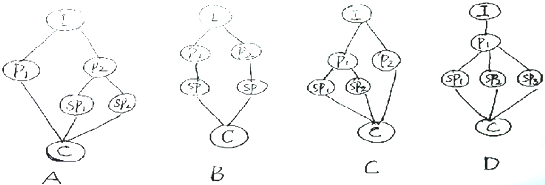题目内容
15.Danish scientists studied more than 1,000healthy joggers and non-joggers over a 12-year period.Those who jogged at a steady pace for less than two and a half hours a week were least likely to die in this time.But those who ran more than four hours a week or did no exercise had the highest death rates.Analysing questionnaires filled out by all the people in the study,scientists concluded the ideal pace was about 8km/h and that it was best to jog no more than three times a week or for 2.5hours in total.People who jogged more closely-particularly those who jogged more than three times a week or at a pace of more than11km/h-were as likely to die as those who did no exercise.
Researcher Jacob Louis Marott,from the Frederiksberg Hospital in Copenhagen,said:"You don't actually have to do that much to have a good impact on your health."
"And perhaps you shouldn't actually do too much.No exercise recommendations across the world mention an upper limit for safe exercise,but perhaps there is one."
Scientists are not yet sure what is behind this trend-but they say changes to the heart during extreme exercise could contribute.In their report,they suggest:"Long-term strenuous exercise may change pathological (病理的) structure of the heart and arteries (动脉)."
Maureen Talbot,senior cardiac nurse at the British Heart Foundation,said:"This study shows that you don't have to run marathons to keep your heart healthy."
"Light and moderate jogging was found to be more beneficial than being inactive or undertaking strenuous jogging,possibly adding years to your life."
"National guidelines recommend we do 140minutes of moderate-intensity activity a week."
"If it may sound like a lot for you,brisk walking(快走) is also a good exercise.And if you're bit of a couch potato,this is a good place to start.
61.From paragraph one,we could knowC.
A.the study took 10years
B.more than 1000joggers took part in the study
C.people with no exercise had the highest death rates
D.joggers and non-joggers are likely to die
62.How should we jog properly from the study?A
A.Jog at a pace of about 8km/h no more than three times a week.
B.Jog at a pace of about 11km/h for 2.5hours in total in a week.
C.Jog at a pace of about 11km/h more than three times a week.
D.Jog at a pace of about 8km/h for 2.5hours a day.
63.The underlined word"strenuous"meansB.
A.light
B.strong
C.enough
D.frequent
64.According to the passage,which of the following is Not True?B
A.There isn't an upper limit for safe exercise across the world now.
B.Running marathons helps keep your heart healthy.
C.Light and moderate jogging may help people live longer.
D.The moderate-intensity activity time in a week could be about 140minutes.
65.What is the main idea of the passage?D
A.Jogging everyday is good to health.
B.Brisk walking is better than jogging.
C.Jogging is not a good activity for people who suffer heart diseases.
D.Jogging too much is no better than doing no exercise.
分析 本文主要讲述了少量、适度的慢跑比不运动或进行高强度慢跑更有益,或可延长你的寿命.而慢跑太多和不进行锻炼对人体有同样的危害.因此,适量的慢跑对人的身心健康有好处.
解答 61.C 细节判段题.根据第一段But those who ran more than four hours a week or did no exercise had the highest death rates.可知不锻炼的人的死亡率更高.故选C.
62.A 细节判断题.根据第二段scientists concluded the ideal pace was about 8km/h and that it was best to jog no more than three times a week or for 2.5hours in total.可知每周至少三次每小时8公里的慢跑.故选A.
63.B 词义辨析题.根据前文 they say changes to the heart during extreme exercise could contribute.可知强烈的锻炼能改善心肺功能,由此推知,"strenuous"的意思是"强烈的".故选B.
64.B 推理判断题.根据第六段的This study shows that you don't have to run marathons to keep your heart healthy.可知马拉松有助于健康.故选B.
65.D 主旨大意题.根据第二段和最后三段可知:少量、适度的慢跑被认为比不运动或进行高强度慢跑更有益,或可延长你的寿命.慢跑太多和不进行锻炼对人体有同样的危害.故选D.
点评 本文考察学生的理解推断能力以及细心程度,只要抓住文章的关键词,采用寻读的方法查找细节,就能找到正确答案.

| A. | at last | B. | at least | C. | in short | D. | in all |
 At home,ordering food from a menu is a normal,everyday routine.I don't even give it a second thought.In China,it's a whole other story!Here,ordering is a fun game of trial and error,and the adventure begins before the food is even served!
At home,ordering food from a menu is a normal,everyday routine.I don't even give it a second thought.In China,it's a whole other story!Here,ordering is a fun game of trial and error,and the adventure begins before the food is even served!